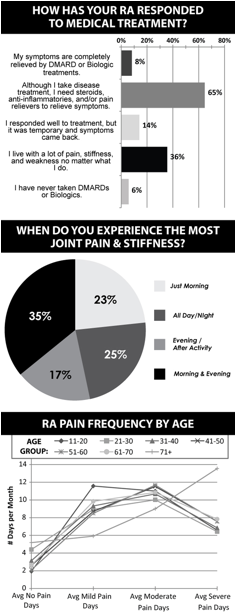Session Information
Session Type: Abstract Submissions (ACR)
Background/Purpose: While rheumatoid arthritis (RA) has been studied for decades, many aspects of the disease are not well understood. Like systemic lupus erythematosus, RA manifests with a spectrum of symptoms that vary between patients and may not be accurately reflected in current literature. The goal of this study was to obtain greater understanding of the nature of RA as experienced by patients.
Methods: A 29-item web-based questionnaire was conducted in 2011 by a secure survey system preventing multiple entries. The questionnaire included questions about RA symptoms and treatments. Percentages and averages were used to summarize the data. 320 patients responded to an online poll with a follow-up question on morning stiffness.
Results: The questionnaire was completed by 1,465 self-reported RA patients (93% women and 7% men); 69% were seropositive (31% were seronegative or were unknown). Time since RA diagnosis varied with a mean of 6.6 years, 25% of respondents diagnosed within the past year, and 52% reported having RA symptoms for longer than a year prior to diagnosis. Low-grade fevers were common (80% reported experiencing sometimes) and most (99%) reported sometimes experiencing fatigue. On average, respondents experienced only 2 pain-free days per month with 68% having zero pain-free days in an average month. Pain levels were not affected by length of time since diagnosis and were similar across age groups, except for higher pain levels reported by those ³ 71 years. Physical activity increased pain for 67%, and decreased pain for 18%. The top 3 factors cited as reducing pain were medications, rest and heat. Medications were reported to reduce pain by 80% of respondents, the majority stating that added medications (i.e., steroids, anti-inflammatories and/or pain relievers) were needed beyond disease treatments to address residual RA symptoms. Symptoms were completely controlled by treatments in only 8% of patients with 36% stating they continue to have a lot of symptoms “no matter what.” While 23% of respondents reported they experience the most joint pain and stiffness in the morning, 25% have joint pain and stiffness all day and night; 52% experience some or most pain and stiffness in the evening or after activity. One-third said they always (12%) or usually (21%) have RA symptoms that their rheumatologists “do not believe or understand.” 75% of respondents reported experiencing either joint damage without obvious swelling or having obvious joint swelling with no resulting damage, indicating the two are frequently unassociated.
Conclusion: The data in this survey indicate patient experiences and symptoms do not always reflect what is traditionally presented in the literature concerning RA pain, morning stiffness, the relationship between swelling and damage, and what worsens or improves symptoms. Additional research should seek a broader understanding of the disease experience of RA.
Disclosure:
K. O. Young,
None;
C. S. Crowson,
None;
D. M. Symons,
None.
« Back to 2013 ACR/ARHP Annual Meeting
ACR Meeting Abstracts - https://acrabstracts.org/abstract/patient-survey-challenges-conventional-notions-regarding-symptoms-and-experiences-of-people-living-with-rheumatoid-arthritis/

